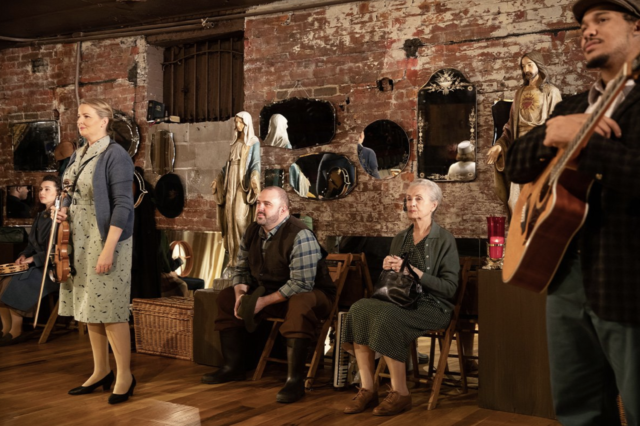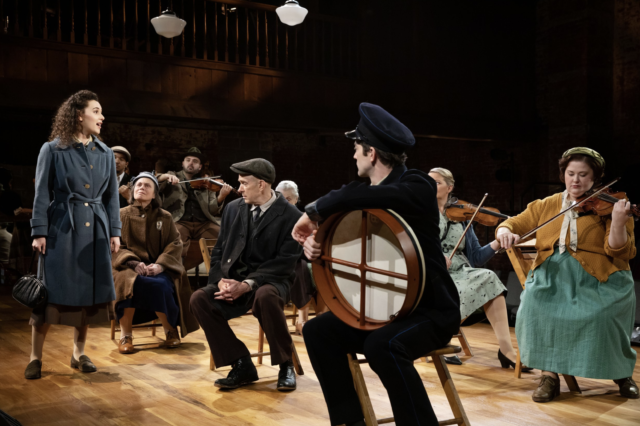
Jim Parsons stars as a parishioner directing his church’s next play in A Man of No Importance (photo by Julieta Cervantes)
A MAN OF NO IMPORTANCE
Classic Stage Company, Lynn F. Angelson Theater
136 East 13th St. between Third & Fourth Aves.
Tuesday – Sunday through December 18
www.classicstage.org
Tony winner John Doyle says farewell to Classic Stage after six years as artistic director with the humbly titled A Man of No Importance. At a talkback following the performance I saw, six of the actors couldn’t stop gushing about Doyle’s unique style and, of course, his importance.
At St. Imelda’s, a small parish church in Dublin in 1964, fortysomething Alfie Byrne (Jim Parsons) has decided that instead of staging Oscar Wilde’s The Importance of Being Earnest again, he and the amateur church theater company will put on Wilde’s controversial 1891 play, Salome, which troubles Father Kenny (Nathaniel Stampley, but I saw Benjamin Howes).
Talking about the choice of play, Father Kenny tells Alfie: “I went to the archbishop myself.” “‘Don’t put him out,’ I said. ‘That little theater is a holy place to Alfie Byrne. He loves Saint Imelda’s the same way some men love women.” Alfie, who is a bus conductor, replies, “I’m sure he had a fine smirk on him when he heard that one.” Father Kenny answers, “The truth be told: You brought this on yourself, Alfie, no one else did. You should have told me this Salome was a dirty play.” Alfie retorts, “It’s not. It’s art, Father, art!”
Father Kenny’s analogy will resonate later when Alfie brings up “the love that dare not speak its name” with an apparition of Oscar Wilde himself.

Characters hang out in the back as the action happens out in front at Classic Stage (photo by Julieta Cervantes)
In a rousing first musical number, we meet the rest of the cast on the bus driven by Robbie Fay (A. J. Shively), including Mr. Carney the butcher (Thom Sesma), mother-of-nine Mrs. Curtain (Kara Mikula) former all-Ireland gymnast Ernie Lally (Joel Waggoner), Peter Pan portrayer Miss Oona Crowe (Alma Cuervo), onetime Saint Joan star Mrs. Grace (usually played by Mary Beth Peil but I saw Beth Kirkpatrick), acting newbie and temporary church janitor Peter Linehan (Da’Von T. Moody), Sodality stalwart Mrs. Patrick (Jessica Tyler Wright), and stage manager Baldy O’Shea (William Youmans).
Everything stops when a fresh face boards the bus, the young, shy, and beautiful Adele Rice (Shereen Ahmed), a country lass arriving from Roscommon; she especially captures the attention of Alfie, who instantly decides she must play Salome, a casting choice that takes a lot of convincing, as Adele has never acted before and appears to be escaping a past she prefers not to discuss.
Alfie lives with his sister, the matronly Lily (Mare Winningham), who is being courted by Mr. Carney. But she refuses to settle down with a man until Alfie weds. When Alfie tells her about Adele, Lily erupts with happiness, singing, “The girls at Sodality / Call me a martyr / But that’ll be all in the past / Now heaven has lifted / The burden of life: / And has brought you a sweetie at last! / Oh . . . / You had better propose to her fast!” Little does Lily know but Alfie has his heart set on someone very different.
As opening night approaches, the revelation of deep-held secrets threatens the production and various characters’ personal lives.

Several actors also play instruments in A Man of No Importance (photo by Julieta Cervantes)
A Man of No Importance features a terrific book by Terrence McNally, who wrote several plays about theater making, including It’s Only a Play, And Away We Go, and Golden Age. McNally captures just the right impression of amateur theatrics, focusing on people for whom theater might not be central to their lives but absolutely necessary.
Composer Stephen Flaherty and lyricist Lynn Ahrens, who have previously collaborated on such musicals as Once on This Island, Anastasia, and Ragtime, contribute lovely songs that celebrate theater (“Going Up” “First Rehearsal”), examine everyday Irish life (“The Streets of Dublin,” “Princess”), and delve into the power, and intolerance, of religion (“Books,” “Our Father,” “Confession”). The unerlying theme is professed by Alfie in “Love Who You Love.”
The score, orchestrated by Bruce Coughlin, is performed by conductor Caleb Hoyer on keyboards, Michael Blanco on bass, Justin Rothberg on guitars and mandolins, and Tereasa Payne on flutes, Irish flutes, recorders, and pennywhistles, playing at the back of the stage balcony; they are joined by many of the actors on acoustic guitar, accordion, violin, drum head (which also double as plates of invisible food), and other instruments on Doyle’s thrust set, where the cast constantly rearranges chairs and other furniture as the story moves from the church and the bus to a bar and a kitchen. At times it is like Doyle is navigating everyone in an adult version of musical chairs.
Parsons is an exceptionally warm and amiable actor, whether he is playing a man throwing a snarky gay party in The Boys in the Band, a gentle soul living in his own alternate reality in Harvey, or the Supreme Being himself in An Act of God. His natural demeanor is so appealing in A Man of No Importance — which debuted at Lincoln Center in 2002 with Roger Rees as Alfie, based on the 1994 film starring Albert Finney — that you want to be his friend, even giving him a break when he occasionally loses his Irish accent. Throughout the show, several actors go into the audience, taking a seat, walking up the aisle, or hanging out in a landing; I was actually disappointed when Alfie did not come up to my row, but I did get a close-up look at Moody and his guitar.
Although all casts attempt to achieve this, this one feels like an inclusive family, with Oscar/Tony nominee and Emmy winner Winningham and Tony nominee Shively standing out; at the talkback, a half dozen of the other actors spoke about how well they were getting along and that Parsons might be the star but he insists on being treated just like everyone else. Saying goodbye to CSC, Doyle makes the audience feel that they’re all part of something important as well.